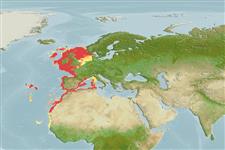Common names from other countries
>
Eupercaria/misc (Various families in series Eupercaria) >
Labridae (Wrasses)
Etymology: Acantholabrus: Greek, akantha = thorn + Latin, gobius = gudgeon (Ref. 45335).
More on author: Risso.
Environment: milieu / climate zone / depth range / distribution range
Ecología
marino asociado a arrecife; rango de profundidad 30 - 500 m (Ref. 2683). Temperate; 62°N - 1°S, 32°W - 11°E
Eastern Atlantic: Norway south to Cape Lopez, Gabon and including Madeira, Azores and the Canary Islands. Also in the Mediterranean and Adriatic seas.
Tamaño / Peso / Age
Maturity: Lm ? range ? - ? cm
Max length : 25.0 cm TL macho / no sexado; (Ref. 5292)
Dark spot on upper part of caudal peduncle and in the end of the spiny part of the dorsal fin (Ref. 35388).
Adults inhabit coastal waters near rocky or sandy bottoms. Feed on benthic invertebrates. Solitary (Ref. 2683). Oviparous, distinct pairing during breeding (Ref. 205). Males build dish shaped nests and guard the eggs (Ref. 205).
Life cycle and mating behavior
Madurez | Reproducción | Puesta | Huevos | Fecundidad | Larva
Oviparous, distinct pairing during breeding (Ref. 205). Males build dish shaped nests and guard the eggs (Ref. 205).
Gomon, M.F. and P. Forsyth, 1990. Labridae. p. 868-882. In J.C. Quero, J.C. Hureau, C. Karrer, A. Post and L. Saldanha (eds.) Check-list of the fishes of the eastern tropical Atlantic (CLOFETA). JNICT, Lisbon, SEI, Paris; and UNESCO, Paris. Vol. 2. (Ref. 5292)
IUCN Red List Status (Ref. 130435)
CITES (Ref. 128078)
Not Evaluated
Threat to humans
Harmless
Human uses
Pesquerías: comercial
Más información
ReferenciasAcuiculturaPerfil de acuiculturaRazasGenéticaElectrophoresesheritabilidadEnfermedadesProcesamientoMass conversion
ColaboradoresImágenesStamps, Coins Misc.SonidosCiguateraVelocidadTipo de nataciónSuperficie branquialOtolitosCerebrosVisión
Herramientas
Special reports
Download XML
Fuentes de Internet
Estimates based on models
Preferred temperature (Ref.
115969): 7.1 - 15.1, mean 9.9 (based on 356 cells).
Phylogenetic diversity index (Ref.
82804): PD
50 = 1.0000 [Uniqueness, from 0.5 = low to 2.0 = high].
Bayesian length-weight: a=0.00977 (0.00539 - 0.01773), b=3.07 (2.91 - 3.23), in cm Total Length, based on LWR estimates for this species & (Sub)family-body (Ref.
93245).
Nivel trófico (Ref.
69278): 3.5 ±0.37 se; based on food items.
Resiliencia (Ref.
120179): Medio, población duplicada en un tiempo mínimo de 1.4-4.4 años (Preliminary K or Fecundity.).
Fishing Vulnerability (Ref.
59153): Low vulnerability (15 of 100).
